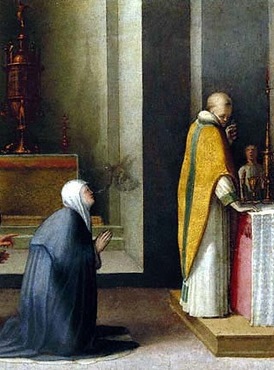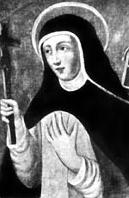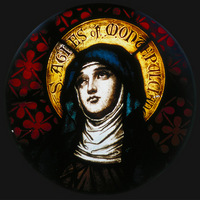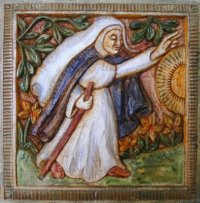The Church observes the liturgical memorial --though it's an optional one-- of the 16th century Dominican pope and saint, Pius V. This towering figure deserves some attention from us today given the various battles we face in the liturgical reform given by Pope Benedict or the persecution of Christians. Much of what we do today in liturgical obedience, church discipline and seminary formation is the result of the work of Pope Saint Pius V. The following text is taken from Dom Prosper Gueranger's The Liturgical Year. Gueranger's style and examination of Pius is romantic it is nonetheless attentive to some important details (the entire entry from the Liturgical Year is not presented here).
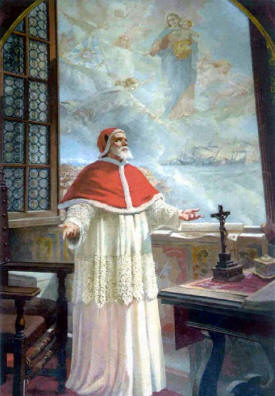
We have already met with the names of several Pontiffs on the Paschal Calendar. They form a brilliant constellation around our Risen Jesus, who, during the period (ed. on the old Tridentine calendar) between his Resurrection and Ascension, gave to Peter, their predecessor, the keys of the kingdom of heaven. Anicetus, Soter, Caius, Cletus and Marcellinus, held in their hands the palm of martyrdom: Leo was the only one who did not shed his blood in the cause of his divine Master, Today there comes before us a holy Pope who governed the Church in these latter times; he is worthy to stand amidst the Easter group of Pontiffs. Like Leo, Pius V was zealous in combating heresy; Like Leo, he saved his people from the barbarian yoke.
The whole life of Pius V was a combat. His pontificate fell during those troubled times when Protestantism was leading whole countries into apostasy. Italy was not a prey that could be taken by violence: artifice was therefore used, in order to undermine the Apostolic See and thus develop the whole Christian world into the darkness of heresy. Pius defended the Peninsula with untiring devotedness from the danger that threatened her. Even before he was raised to the Papal Throne he frequently exposed his life by his zeal in opposing the preaching of false doctrines. Like Peter the Martyr, he braved every danger and was the dread of the emissaries of heresy. When seated on the Chair of Peter, he kept the innovators in check by fear, roused the sovereigns of Italy to energy and by measures of moderate severity drove back beyond the Alps the torrent that would have swept Christianity from Europe had not the Southern States thus opposed it. From that time forward, Protestantism has never made any further progress: it has been wearing itself out by doctrinal anarchy. We repeat it: this heresy would have laid all Europe waste, had it not been for the vigilance of the pastor who animated the defenders of truth to resist it where it already existed, and who set himself as a wall of brass against its invasion in the country where he himself was the master.
Another enemy, taking advantage of the confusion caused in the West by Protestantism, organized an expedition against Europe. Italy was to be its first prey. The Ottoman fleet started from the Bosphorus. This again would have meant the ruin of Christendom but for the energy of the Roman Pontiff, our Saint. He gave the alarm, and called the Christian Princes to arms. Germany and France, torn by domestic factions that had been caused by heresy, turned a deaf ear to the call. Spain alone, together with Venice and the little Papal fleet, answered the summons of the Pontiff. The Cross and Crescent were soon face to face in the Gulf of Lepanto. The prayers of Pius V decided the victory in favour of the Christians, whose forces were much inferior to those of the Turks. We shall return to this important event when we come to the Feast of the Rosary in October. But we cannot omit to mention today the prediction uttered by the holy Pope, on the evening of the great day of October 7, 1571. The battle between the Christian and Turkish fleets lasted from six o'clock in the morning till late in the afternoon. Towards evening, the Pontiff suddenly looked up towards heaven, and gazed upon it in silence for a few seconds. Then turning to his attendants, he exclaimed: "Let us give thanks to God! The Christians have gained victory!" The news soon arrived at Rome; and thus, Europe once more owed her salvation to a Pope! The defeat at Lepanto was a blow from which the Ottoman Empire has never recovered: its fall dates from that glorious day.
The zeal of this holy Pope for the reformation of Christian morals, his establishment of the observance of the laws of discipline prescribed by the Council of Trent and his publication of the new Breviary and Missal have made his six years' pontificate to be one of the richest periods of the Church's history. Protestants themselves have frequently expressed their admiration of this vigorous opponent of the so-called Reformation. "I am surprised," said Bacon, "that the Church of Rome has not yet canonized this great man." Pius V did not receive this honour till about a hundred and thirty years after his death; so impartial is the Church, when she has to adjudicate this highest of earthly honours even to her most revered Pastors!
The heretics attempted more than once to destroy a life which baffled all their hopes of perverting the faith of Italy. By a base and sacrilegious stratagem, aided by treachery, they put a deadly poison on the feet of the crucifix which the Saint kept in his Oratory, and which he was frequently seen to kiss with great devotion. In the fervour of prayer, Pius was about to give his mark of love to the image of his crucified Master, when suddenly the feet of the crucifix detached themselves from the Cross and eluded the proffered kiss of the venerable old man. The Pontiff at once saw through the plot whereby his enemies would fain have turned the life-giving Tree into an instrument of death.
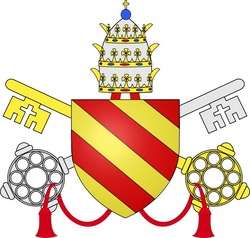
In order to encourage the faithful to follow the sacred Liturgy, we will select another interesting example from the life of the great Saint. When lying on his bed of death, and just before breathing his last, he took a parting look at the Church on earth, which he was leaving for that of heaven, he wished to make a final prayer for the flock which he knew was surrounded by danger; he therefore recited, but with a voice that was scarcely audible, the following stanza of the Paschal hymn: "We beseech thee, O Creator of all things that in these days of Paschal joy, thou defend thy people from every assault of death!"
Pontiff of the living God, thou wast,
whilst on earth, the pillar of iron and wall of brass, spoken of by the prophet
(Jer I,18). Thine unflinching firmness preserved the flock entrusted to thee
from the violence and snares of its many enemies. Far from desponding at
the sight of the dangers thou didst redouble thy courage just as men raise the
embankments higher when they see the torrent swell. By thee was the spread of
heresy checked; by thee was the Mussulman (i.e., a Muslim) invasion repelled,
and the haughty Crescent humbled. God honoured thee by choosing thee as
the avenger of his glory and the deliverer of Christian people: receive our thanks
and the homage of our humble praise! By thee were repaired the injuries done to
the Church during a period of unusual trial. The true reform - the reform
that is wrought by authority - was vigorously applied by thy strong and holy
hand. To thee is due the restoration of the Divine Service by the
publication of the books of holy Liturgy. And all these glorious deeds
were done in the six short years of thy laborious pontificate!
